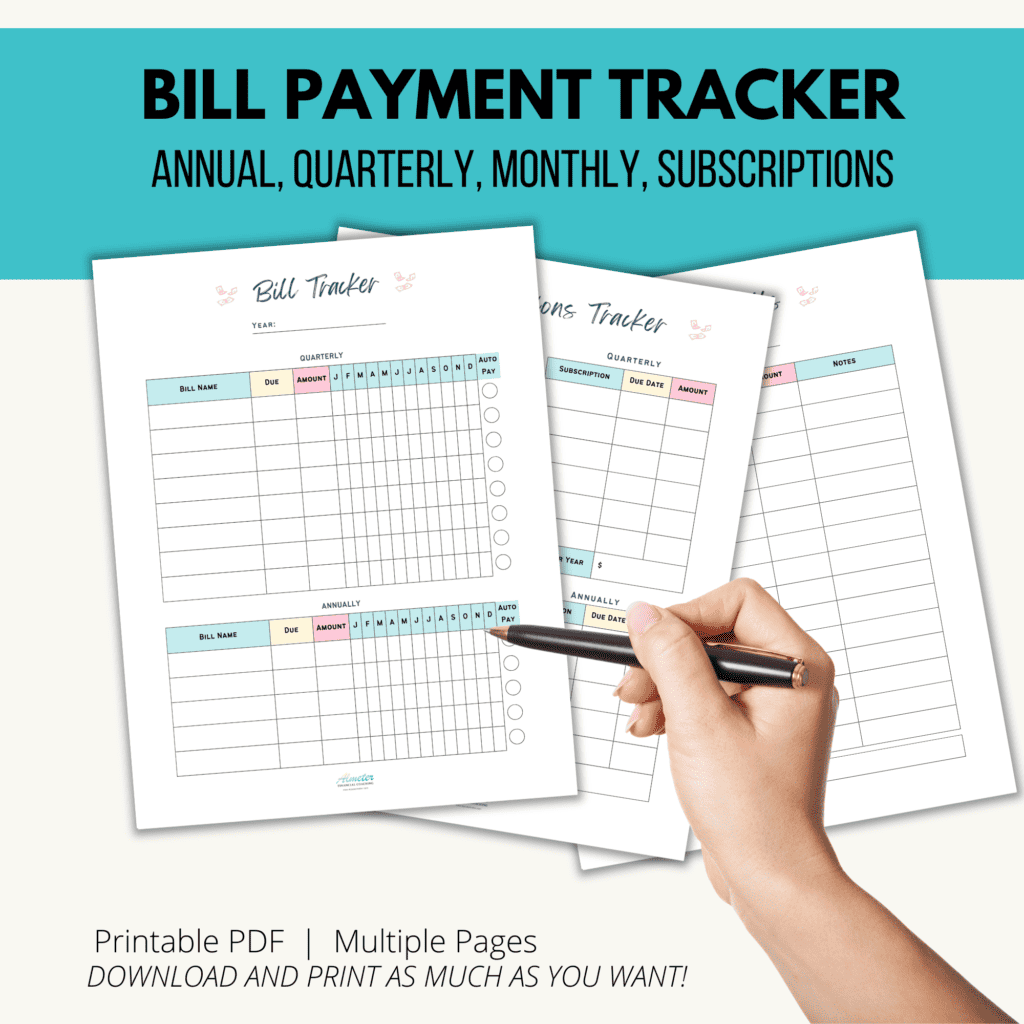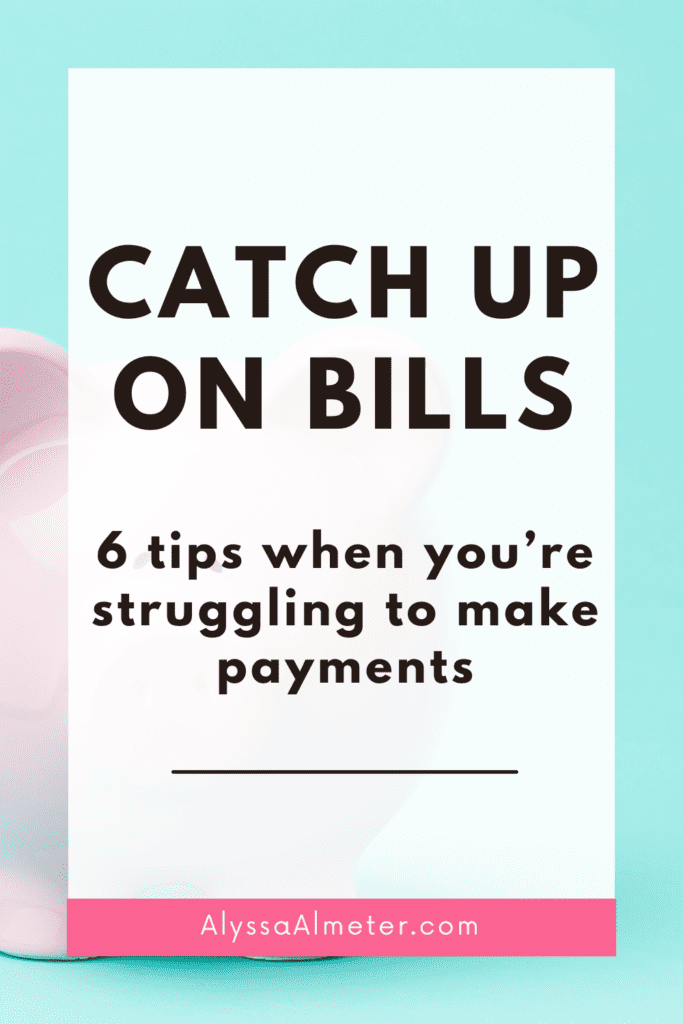This post may contains affiliate links. As an Amazon Associate I may earn from qualifying purchases at no additional costs to you. Please see the Policies pages for more info.
How to Catch Up on Bills
In today’s fast-paced world, staying on top of financial obligations can be a constant challenge. If you’re struggling with debt or are feeling disorganized with all the different due dates, you’ve probably wondered how you can catch up on bills.
In this blog post, I’ll share 6 simple actions you can take to make bill payments with ease.
1. Make a Monthly Money Plan
First and foremost, if you are struggling to pay your bills that means you probably don’t have a written budget. A zero-based budget that lists all your income and all your expenses for the month is the foundation to managing money well and staying on top of bill payments.
Before the month begins, make a zero-based budget by listing all your expected income for the month and all your expenses. You will want to tweak your budget until income minus expenses equals zero. It’s putting a plan in place for every dollar that is going out with every dollar earned.
Having a budget gives you a plan so you know exactly what your expenses are for the month. You can do it on paper, spreadsheet or a budgeting app.
If your budget is tight and/or you have more expenses than income for the month, that brings us to the next tip, prioritizing spending.
2. Prioritize Your Spending
Have you ever had to put groceries on a credit card because your checking account was low?
Or you can pay some bills easier than others?
If your budget is tight and you seem to have more month than money, then you have to prioritize your spending.
When you are making your budget there are 4 categories that you should be able to cover before anything else, and they are:
- Food
- Shelter (mortgage, rent, home/renters insurance)
- Utilities (electric, gas, water, sewer)
- Transportation (gas, car insurance, public transportation costs)
Make feeding your family, providing shelter and transportation to work top priority over any other expenses so you can take care of your basic needs first. Once those things are planned for then you can make a plan for other categories.
3. Audit Your Budget
Still can’t afford to pay your bills? Then it’s time to take a closer look at your spending. Everyone has areas in their budget they can probably cut back on and save some money.
By identifying a few areas in your budget that you can save money on, you are freeing up more cash to get those important bills paid.
Some common categories to review are:
- Food – it’s easy to go crazy in the grocery store or spend too much eating out. Try to cook more meals at home and find ways to save money in the grocery store.
- Subscriptions that you no longer use but forget to cancel or delay. A lot of streaming services will let you pause your subscription for a period of time. Do this when you’re not watching TV as much like in the summer.
- Cable TV – there are so many streaming options now, you can probably cancel your service and find cheaper options.
- Insurance – check your car and home insurance provider to make sure you’re not over paying for things you don’t need. Or shop around for better rates.
If you are new to budgeting you can do this as you go. Writing down your expenses for the first time is a good eye opener.
Audit your budget at least quarterly since different things can pop up throughout the year.

4. Extra Income
So you have a zero-based budget and cut expenses as much as you can but you’re still struggling to pay your bills because you need more money – then it’s time to find ways for extra income.
Or maybe you want some extra cash to pay down your debts – therefore reducing your bills.
Ideas for extra income:
Part time job – it doesn’t have to be something you commit to for a long time. Having that extra cash for a few months while you catch up on bills will be worth the effort.
Sell things – clean out what you no longer need in the house and sell them on Facebook Marketplace
Side hustle – tutoring, babysitting, mowing lawn, shoveling snow, helping a neighbor with house projects, InstaCart shopper, Uber Driver, etc.
In today’s digital world there are endless opportunities to make some extra cash to help you catch up on bills. Make a list of things you enjoy doing and are very good at. You might come across an idea that someone will be willing to pay you for!
5. Make Paying Bills Easier with Automatic Payments
Take advantage of the ease of automatic payments to make sure your payments are made on time. Automatic payments save you time so you don’t have to remember to submit your payment.
Even though automatic payments are a convenient way of getting your bills paid on time, you still have to make sure you have money in your account to cover those costs. But as long as you are prioritizing your spending and making a budget each month you should feel confident that you have the money to cover those bills.

6. Never Miss a Payment by Using a Bill Tracker
Forgetting important payment dates? Then it’s time to get organized with a bill payment tracker.
How is a bill tracker different than a budget?
Bill trackers can be used in conjunction with your budget. You can list all your usual monthly, quarterly and annual payments. They are a quick recap of your bills for the month and when they are due. You can also use it as a checklist when bills are paid.
Having a bill tracker is especially important for payments that only happen quarterly or annually such as insurance premiums or gym memberships. It’s easy to forget those ones that don’t pop up every month.
If you are a visual person, having a bill calendar might work well for you as well. A bill calendar is just a separate calendar where you list all your bills for the month. Then you can see exactly which day payments are due on which days of the month.
Pay your bills on time by using my Bill Payment Tracker.
Conclusion
I am confident that if you implement these 6 simple steps, you will not longer wonder how to catch up on bills. You will be organized and have a plan in place that gives you peace of mind when it comes to handling your money.
Related Articles to Help You Pay Your Bills
Make a Budget: 5 Simple Steps to Get Started
How to Use the Debt Snowball to Payoff Debt Faster


